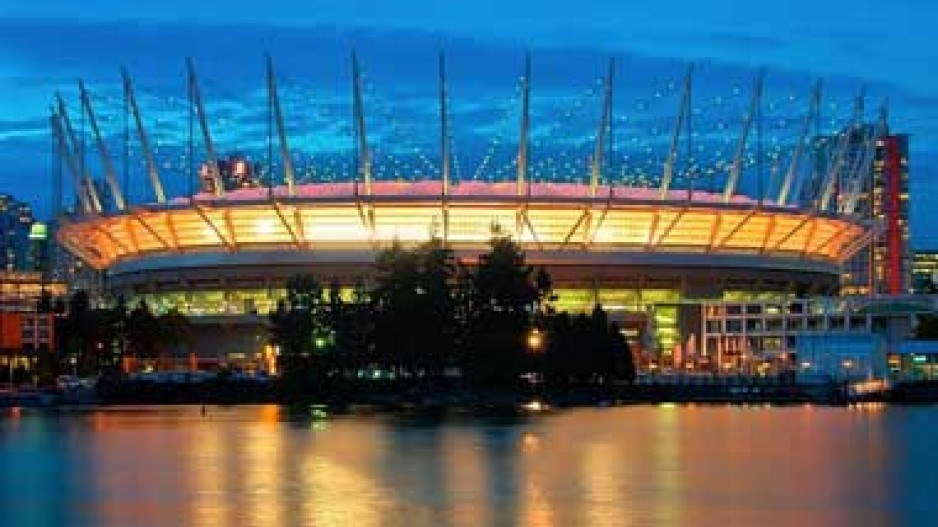Taxpayers footed a $15.2 million bill for equipment installed in BC Place by Telus, which was paid for services that were originally meant to be included in the 2011-renovated stadium naming rights deal, Business in Vancouver has learned.
A bill of sale dated October 1, 2011, the day after the stadium reopened, was finally executed July 31, 2012. It included $6,389,489.24 for the StadiumVision TV system, $4,671,710.47 for the stadium telecommunications network and $5,054.063 for external video boards. Equipment included items sourced from Cisco Systems, Avaya Canada and Siemens Enterprise Communications. The bill said the purchase price was to be paid within two business days, but the contract wasn't executed for 10 months.
The contract was obtained by BIV via Freedom of Information on April 15, five months after filing a request with BC Pavilion Corp. (PavCo).
Telus was supposed to become the title sponsor of the stadium under a 20-year deal worth up to $40 million. The BC Liberal government nixed the sponsorship in February 2012. Pat Bell, who was the minister responsible at the time, said in March 2012 that the BC Place name was "iconic" and that the agreement with Telus "did not provide the best value for taxpayers. He claimed lost revenue would be made up from ad sales.
The existence of the contract was kept secret by the government and PavCo until last November when BIV revealed an agreement was reached with Telus last summer. The government refused to reveal the cost, due to the "commercially sensitive nature of the technology installed," according to a briefing note prepared for PavCo minister Rich Coleman.
Competitors Bell, Rogers and Shaw continued to complain to government in early 2012 about the June 2011 direct award of a $1 billion, 10-year government-wide telecommunications contract to Telus. A two-year bidding process for nine separate contracts was halted and the work combined into one bundle for Telus.
In January of this year, Telus executives admitted they were talking with the government about resurrecting the naming rights sponsorship.
The contract said all charges were based on costing methodologies and practices by Telus and in accordance with generally accepted accounting principles.
"In the event an audit by BC Place determines that Telus' cost for the assets is less than the amounts set forth in the above tables, the purchase price shall be decreased on a dollar for dollar basis by the difference between such amounts," said the document.
The network build involved the cost to buy, splice and terminate fibre and pre-paid Telus maintenance to December 2014. The Telus contribution for WiFi traffic was deducted and described as "Telus right to use 799 access ports on riser switches and associated fibre/copper cabling for 20 years."
Deductions were also censored for PavCo's upfront capital contribution and advertising contribution for the three external video boards, which must remain dark from 11 p.m. to 7 a.m.
Telus has the right, after consulting PavCo, to set prices and sell the outdoor ads. The terms included allowances for one six-second full screen ad each for Pepsi Bottling Group and BC Place public service announcements and upcoming events, based on a 54-second, continuous loop rotation.
The contract contemplated six-month notice for temporary suspension of Telus services for international or national events that may involve a sponsor conflict. It also contemplated relocation or removal of the Cambie video board for redevelopment west of the stadium. Paragon Gaming was permitted in 2011 to move its existing licence from the Edgewater Casino to a proposed complex on that site, but Vancouver city hall voted against expanded gambling. The project remains in limbo.
"If no other location at the stadium is available or acceptable to BC Place and Telus, acting reasonably, then BC Place may at its option either pay Telus the fair market value for the Display or direct Telus, on behalf of BC Place, to immediately proceed to sell the Cambie Display at fair market value," the document said.
Last summer, the government claimed the cost of the renovation was $514 million. That was below the $563 million budget that included a German-engineered retractable roof, but considerably higher than the original, January 2008 estimate of $75 million estimate to replace the original air-supported fabric roof.




